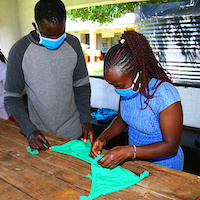Managing and saving water in the modern world
This week sees the countdown of the last few days before World Water Day 2014. In some ways this is as simple a theme as you’ll get in the development events calendar; everyone agrees on the importance of water. It's not that simple, of course. Water is integral to so many industrial and social needs that the issues surrounding it have become very complex. The influence of water — its provision, supply and cost — extends to such areas as land rights, human rights, economics, sustainability, infrastructure — and even energy. About eight per cent of global energy generation is used for pumping, treating and transporting water to various consumers. However, water treatment has changed a lot in recent years. Fast-growing economies with little access to clean water need to remove salt from the sources they do have. That process — desalination — takes a lot of energy. However, energy requires water. Energy generation and transmission require utilization of water resources, particularly for hydroelectric, nuclear, and thermal energy sources. Even wind, solar and other renewables can require some water. Many of these discussion points, and a lot more, will be under the microscope during this year’s UN World Water Day when the chosen theme will be Water and Energy. The key messages of World Water Day are easy to summarise. Firstly, as we have said, water requires energy and energy requires water. However, supplies are limited and demand is increasing. The ‘bottom billion’ of the world’s population in particular urgently needs access to water, sanitation services and electricity. It’s clear too that saving energy means saving water and saving water means saving energy. All of which can be summed up in the final part of the key messages: improving water and energy efficiency is imperative, as are coordinated, coherent and concerted policies. For Friends of Londiani, getting, using and trying not to waste water has always been important. So we will be among the many observers interested to see how the latest World Water Development Report assesses the situation. But we will all have to wait a few more days for that. It appears on 21 March, the day before World Water Day itself. In the meantime have a look at http://www.unwater.org/worldwaterday and, if you have not done so before, the themes of previous such days at http://www.unwater.org/worldwaterday/about-world-water-day/past-world-water-days/en/. What the UN calls ‘focusing attention on the importance of freshwater and advocating for the sustainable management of freshwater resources’ really is a much more complex and challenging business than you might think.

